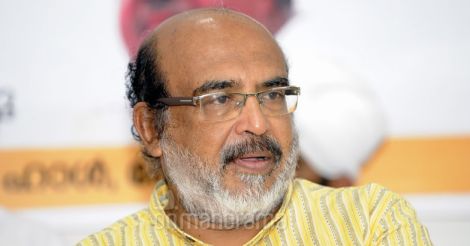New Delhi: Kerala extracted more benefits from the upcoming Goods and Services Tax (GST) regime with the GST Council submitting to state finance minister T.M. Thomas Isaac’s demand to tax private lotteries from other states on a par with gambling.
Under the new tax regime that comes into effect on July 1, government-authorized private lotteries will be taxed at a 28 percent rate, while lotteries directly run by the state governments will be taxed at 12 percent, up from a previous proposal for 5 percent.
Isaac lashed out at the attempts to lower taxes on lotteries in the GST Council meeting in New Delhi on Sunday. He even threatened to boycott the meeting after the northeastern states lobbied for lower taxes on lotteries.
He said private lotteries should be taxed at the same rate as horse race and gambling. He found support from his Jammu and Kashmir counterpart.
The lotteries from the northeastern states are likely to have a tough time surviving with a 28 percent tax rate as most of them are sold in other states through agents. Isaac has also said that agents who sold lotteries from other states will not be allowed to sell Kerala government’s lotteries.
Reprieve for hotels
Kerala and other states which rely on tourism were also benefited from a decision not to impose a 28 percent tax on air-conditioned hotel rooms with a rent below Rs 7,500 per day, not Rs 5,000 as earlier planned. Rooms with rent between Rs 2,500 and Rs 7,500 will have a tax rate of 18 percent. Similar tax rates may be applicable to houseboats as well.
The tax rate at restaurants attached to star hotels has been fixed at 18 percent.
Against profiteering
The central and state governments have decided to put in place committees to ensure that businesses and service providers pass on to consumers the benefits granted by the GST. The GST Council has approved anti-profiteering rules to form the mechanism.
The state governments are expected to publish a list of tax rates before and after the GST to make customers aware of the changes.
Isaac said that the GST is expected to lessen the tax burden by Rs 1 lakh crore and the government was taking all steps to ensure that corporates did not profit from this relief. He also said that some companies have been increasing prices for their products ahead of the GST implementation in a bid to deprive consumers of the benefit offered by the Act.
E-way
The GST Council approved an ‘e-way’ system to untangle the rush at the border check posts by uploading details of goods movement to a computer network. Isaac, however, said that the check posts would be still be in existence in Kerala until the e-way was functional.
Goods vehicles will be let in only after examining the invoices, he said. Even after the introduction of e-way, the cameras at the check posts will continue scanning e-way bills.
The GST Council will consider on June 30 the state’s other demands including a tax for ayurveda medicines on a par with modern medicines, an increase in taxes for cosmetics and a decrease in tax for bamboo products.
Celebration time
The GST Council meeting on June 30, on the eve of the implementation of the new system, will be followed by a celebration at Parliament’s Central Hall.
Though the new system will be in effect from July 1, businesses have been given time until September 5 to file returns for July. The GST Council also decided to grant businesses 10 additional days to file the returns for August. Now, they have time until September 20.

























 Thomas Isaac
Thomas Isaac